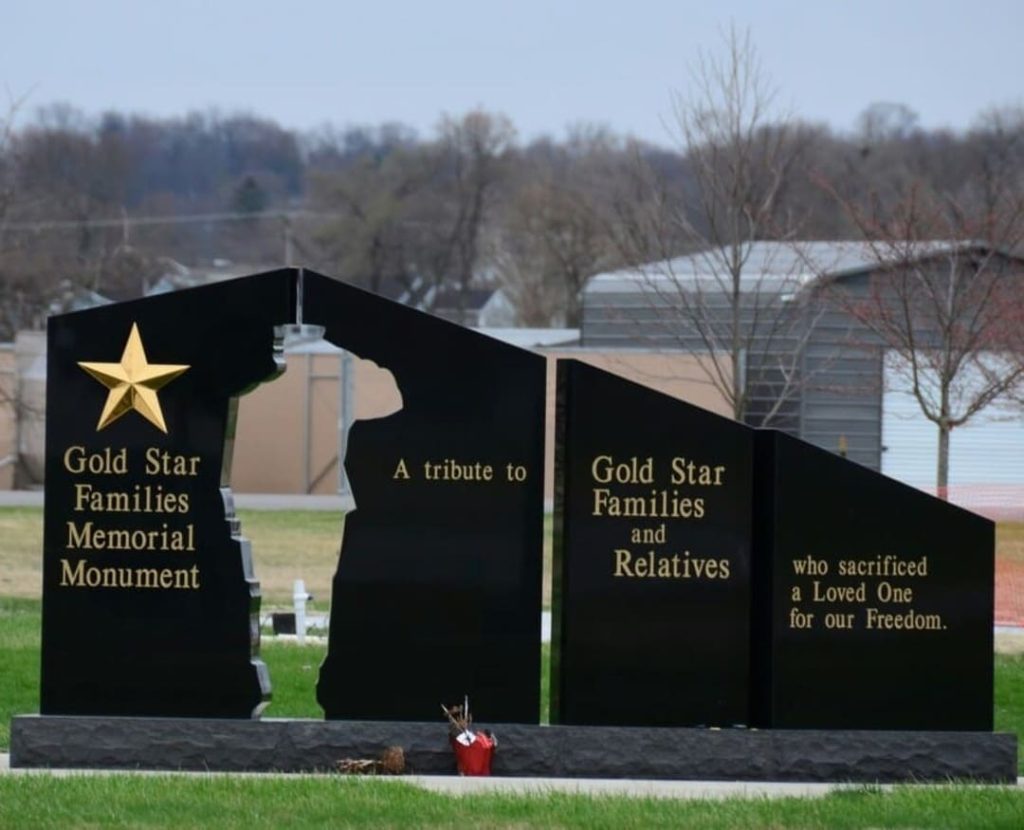Looking for Expert-Level VA Claim Answers?📱Call Us Now! 737-295-2226
Gold Star Families represent the strength, sacrifice, and resilience of those who have lost a loved one in military service.
These families carry a unique burden, and while no benefit can ever replace their loss, there are programs and resources available to provide meaningful support.
This guide offers a clear overview of the benefits and support available to Gold Star Families.
Table of Contents
Summary of Key Points
- Gold Star Families are immediate family members of a service member who died in the line of duty.
- Benefits include monthly compensation, education support, healthcare, burial honors, and access to national parks.
- Many benefits have eligibility rules or time limits, so it’s important to stay informed and act promptly when applying.
What is a Gold Star Family?

A Gold Star Family is the immediate family of a U.S. military service member who died while serving in a time of conflict.
Gold Star Families may include spouses, children, parents, and other dependents of the deceased service member.
The term dates back to World War I, when families would hang flags with blue stars for each serving loved one; those stars turned gold if the service member died in service.
Today, the designation acknowledges the profound loss and enduring sacrifices of families who have given so much to our country.
List of 12 Gold Star Family Benefits
1. Dependency and Indemnity Compensation (DIC)
Dependency and Indemnity Compensation (DIC) is a tax-free monthly payment provided by the VA to eligible survivors of service members who died in the line of duty or from a service-connected condition.
Surviving spouses typically receive a base monthly rate, which may be adjusted based on factors like the presence of dependent children or disabilities.
Parents of fallen service members may also qualify for DIC based on income and dependency.
Learn More About DIC: VA Survivor Benefits
2. Burial and Memorial Benefits
Gold Star Families may be eligible for a range of burial and memorial benefits that honor the life and sacrifice of their loved one.
The VA offers burial in a VA national cemetery, including the gravesite, opening and closing of the grave, perpetual care, and a government-provided headstone, marker or medallion and a burial flag, all at no cost.
Surviving spouses may also be eligible for burial alongside the service member.
3. Death Gratuity Payment
The Department of Defense provides a special tax-free one-time payment of $100,000 to eligible survivors of service members.
It applies to deaths occurring during active duty, authorized travel, training, and certain reserve officer training activities.
The death gratuity provides immediate financial assistance to help survivors of deceased service members cover urgent expenses before other benefits become available.
It may also be paid if a service member dies within 120 days of discharge, and the VA determines the death was related to a service-connected injury or illness.
4. Military Health Care Coverage
Surviving spouses and children of fallen service members remain eligible for military health care through TRICARE.
Spouses receive TRICARE at active-duty dependent rates for three years after the service member’s death (transitional survivor status), after which costs adjust to retiree levels.
Children remain eligible for this enhanced coverage until age 21, or 23 if enrolled in college, with no enrollment fees or co-pays under TRICARE Prime.
Note: If a surviving spouse remarries, they lose access to TRICARE. CHAMPVA, however, may be restored if the remarriage ends.
5. Military Dental Care Benefits
If a service member dies and their spouse or children are already enrolled in the TRICARE Dental Program, they can receive free dental coverage for three years.
After that, they’ll be told when the free coverage ends and if they qualify for another dental plan.
Families living overseas who weren’t enrolled because they used a military dental clinic can sign up again and get the same three years of free coverage.
Young children under age four who weren’t old enough to enroll before the service member’s death can still get this coverage, too.
6. Education Benefits
Eligible Gold Star Families may qualify for specific education benefits, including:
In addition to federal support, many states offer their own education benefits for Gold Star Families, such as tuition waivers, grants, or scholarships at public colleges and universities.
These state-level programs vary widely, so be sure to check with your local VA office to find out what additional resources may be available to your family.
7. VA Home Loan Guaranty
As a surviving spouse of a service member, you may be eligible for the VA Home Loan Guaranty, which can help you buy, build, repair, or refinance a home.
To get started, you’ll need to apply for a Certificate of Eligibility (COE) through the VA.
This benefit makes it easier to secure a loan, often with no down payment, no private mortgage insurance (PMI), and competitive interest rates.
8. Life Insurance
If you’re covered under a Family Servicemembers’ Group Life Insurance (FSGLI) policy as a military spouse, you may be eligible to convert that coverage into an individual life insurance policy.
Note: This must be done within 120 days of your loved one’s passing.
9. Survivors’ Pension
The Survivors’ Pension provides monthly, tax-free payments to eligible surviving spouses and unmarried dependent children of wartime Veterans.
To qualify, you must meet income and net worth limits set by Congress. This benefit helps provide ongoing financial support to families who have lost a loved one who served during a period of war.
10. Exchange and Commissary Access
Surviving spouses may continue to access military commissaries and exchanges, provided they haven’t remarried.
Eligible dependents, such as children of the deceased service member, may also receive exchange and commissary privileges.
Note: You must have proper identification for access.
11. Free Entry into National Parks
Gold Star Families are eligible for a free Military Lifetime Pass that grants access to national parks, wildlife refuges, forests, and other federal recreation lands.
This pass covers entrance and standard day-use fees and can be picked up in person at many park sites or ordered online.
12. Free TSA PreCheck Enrollment
Gold Star Families can enroll in or renew TSA PreCheck for free by providing a verification letter confirming their status from the Tragedy Assistance Program for Survivors.
This offer is available through CLEAR or IDEMIA and applies to both new applicants and those renewing an existing membership.
To get started, contact TAPS to obtain your eligibility letter, then complete the process online through your chosen enrollment provider.
Additional Resources for Gold Star Families
In addition to federal benefits, many organizations offer emotional, educational, and financial support for Gold Star Families, including:
- Tragedy Assistance Program for Survivors (TAPS): Offers peer support, grief counseling, retreats, and resources.
- American Gold Star Mothers, Inc.: A community for mothers who have lost a child in service.
- Gold Star Wives of America, Inc.: Advocacy and support for surviving spouses and children.
- State-level Veterans Departments: Many states offer additional benefits, like tuition waivers or property tax relief, for Gold Star Families.
Conclusion
Losing a loved one in military service changes everything—and the weight of that loss is real. But you don’t have to face it without support.
Through a combination of VA benefits, federal programs, and nonprofit support, you may be eligible for healthcare, education, housing assistance, and memorial services that honor your loved one’s legacy.
Understanding your benefits and taking action before certain deadlines can make a meaningful difference in the support your family receives.
If you’re unsure where to start, organizations like TAPS can help guide you through the process.
(FAQs) Frequently Asked Questions

How many Gold Star Families are there?
Exact numbers vary, but it’s estimated that there are tens of thousands of Gold Star Families across the United States. Each year, more families are recognized due to continued service-related losses.
When is Gold Star Family Day?
Gold Star Mother’s and Family Day is observed each year on the last Sunday of September. This day honors the families of fallen service members and serves as a national moment of remembrance and gratitude. Initially established by Congress in 1936 as Gold Star Mother’s Day, the observance has since expanded to recognize all Gold Star Families.
Do Gold Star Family benefits expire?
Gold Star Family status itself never expires, but many benefits have time limits, such as TRICARE health coverage for spouses lasting three years at active-duty rates and education benefits that expire after 10 years. Children’s benefits generally end by age 21 or 23 if the individual is in college, while commissary and exchange access continue indefinitely unless the spouse remarries.
How much do Gold Star Families get paid monthly?
Gold Star Families receive the Dependency and Indemnity Compensation benefit, a tax-free monthly payment from the VA to help survivors financially. The monthly amount depends on individual circumstances and is subject to annual cost‑of‑living adjustments. Amounts also vary based on the service member’s year of death and pay grade at the time of death. As of 2025, the base rate for surviving spouses is $1,653.07 per month.
Are there Gold Star benefits for seniors?
Yes, senior Gold Star family members may be eligible for benefits such as the Survivors Pension, access to VA healthcare, and the National Parks Lifetime Military Pass. Eligibility is determined by factors such as income, relationship to the deceased service member, and age.
Author

Kelly Olone
Kelly Olone is a military spouse who earned her degree in Psychology from Florida International University. After working in the non-profit sector for several years, she turned to her passion for writing. She aims to contribute to a better understanding of the valuable benefits that veterans deserve. As a mom, Kelly navigates the delicate balance between deadlines and bedtime stories with finesse.



